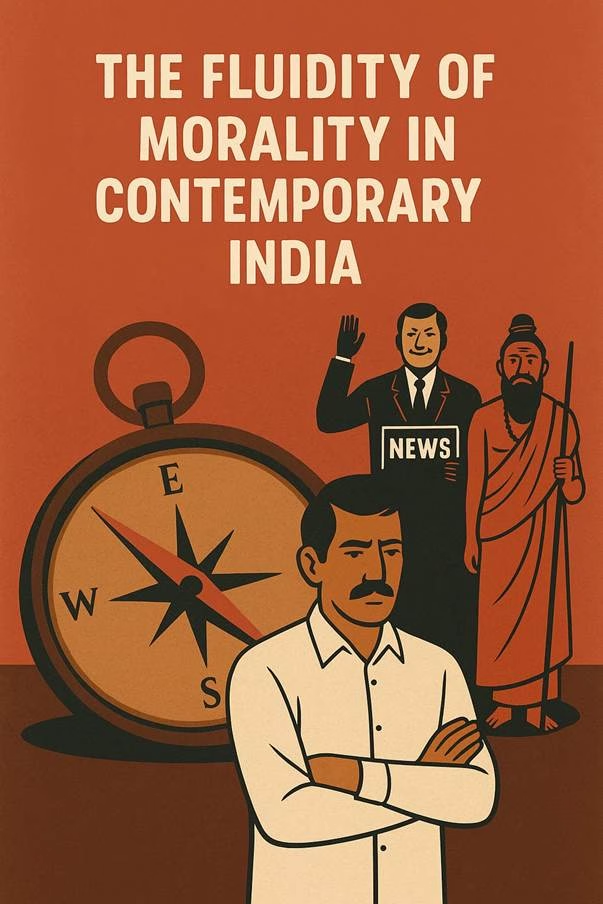
Morality in India has grown fluid—not because ethics has ceased to matter, but because its meaning has become negotiable. In the swirl of politics, profit, media, and identity, right and wrong are no longer grounded in conscience but in convenience. Across society, ethical standards bend to power, tribe, and timing.
Yet India is a land that once gave the world deep reflections on dharma, justice, and the moral self. What would our great minds—Kautilya, Gandhi, Ambedkar, Vivekananda—say about the India of today?
Power Over Principle
Politics in India no longer seeks to uphold morality—it seeks to manufacture it. Leaders facing charges of violence or corruption quote scriptures and pose with deities to signal virtue. Morality is reduced to branding.
Kautilya warned, “In the interests of the king, no wrongdoing is considered wrong.” His caution against unchecked power is now mistaken as license. Today’s rulers often use moral symbolism to mask moral failure.
Even the public has adapted: what is corrupt in an opponent becomes “cleverness” in an ally. This ethical double standard hollows out accountability.
Media and the Illusion of Virtue
India’s media has become a loudspeaker of moral theatre. Truth is subordinate to narrative, and narrative to viewership. Televised debates mimic justice but deliver spectacle. On social media, morality is filtered through aesthetics: polished visuals, viral quotes, righteous hashtags.
Swami Vivekananda once said, “Truth does not pay homage to any society, ancient or modern. Society must bow to Truth or die.” But today, truth bows to algorithms, and society adapts to the fiction that trends.
The result is a moral market—outrage is performative, virtue is branded, and real justice struggles to find airtime.
Culture of Convenience
In professional life, morality is equated with inefficiency. Bribes are “facilitation,” nepotism is “networking,” and tax evasion is “smart strategy.”
As Dr. B.R. Ambedkar said, “So long as you do not achieve social liberty, whatever freedom is provided by the law is of no avail.” But in a society obsessed with outcomes, liberty is privatized and ethics outsourced. Success now sanctifies methods. A corrupt businessman can become a motivational speaker, and a tainted minister an icon of nationalism.
Convenience trumps character—and the line between ambition and amorality blurs.
Everyday Erosion
This ethical decline is not exclusive to the elite. It seeps into everyday life. People justify lies as “adjustments,” justify hate as “opinion,” and excuse injustice as “complicated.”
The great poet and philosopher Rabindranath Tagore lamented this tendency early on:
“The moral growth of a nation does not begin by scribbling slogans on walls, but by awakening its soul.”
Today, slogans abound—but the soul sleeps. Rituals outshine reflection. A person may light a lamp in a temple and switch off empathy outside it.
The Last Holdouts
Yet, there are citizens who refuse this drift: investigative journalists risking careers, students protesting injustice, bureaucrats refusing bribes, and citizens protecting constitutional values.
Gandhi believed, “The true measure of a society is how it treats its weakest members.” These resistors uphold that idea—not through slogans, but through silent courage. They remind us that morality is not dead—it is merely drowned out.
But these voices are mocked, attacked, or ignored. Idealism is seen as naïve. Yet without these holdouts, India’s moral memory would fade.
Conclusion: The Risk of a Hollow Republic
India’s moral crisis isn’t rooted in ignorance—it’s rooted in adaptation. Ethics has become elastic, shaped by advantage rather than truth. What’s right is no longer universal—it’s tribal.
A nation that forgets its moral center becomes a stage for strongmen, a marketplace for virtue, and a battleground of identities.
Subscribe to Our Newsletter
Get the latest CounterCurrents updates delivered straight to your inbox.
As Sri Aurobindo wrote, “A nation is not a piece of earth; it is a living soul.” If our soul becomes indifferent to justice, empathy, and truth, then no amount of economic growth or technological advancement can redeem us.
And when morality becomes a costume, the republic becomes a performance.
Ashish Singh has finished his Ph.D. coursework in political science from the NRU-HSE, Moscow, Russia. He has previously studied at Oslo Metropolitan University, Norway; and TISS, Mumbai.













































